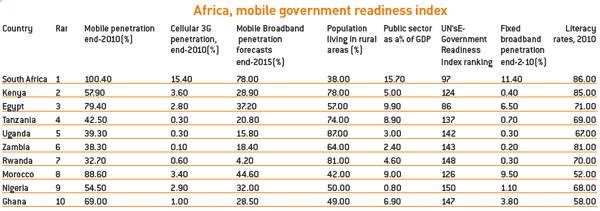Where’s the money in mobile government?
If mobile government services in Africa are to be more sustainable than previous e-government initiatives, they must benefit all stakeholders. Today, the business model is uncertain. To put it bluntly, governments have limited budgets and the end users with most to gain from mobile government are often living in poverty in remote rural areas. As a result, telecom operators anticipate only modest, if any, return for providing low-cost connectivity and backhaul for these services.
November 21, 2011

If mobile government services in Africa are to be more sustainable than previous e-government initiatives, they must benefit all stakeholders. Today, the business model is uncertain. To put it bluntly, governments have limited budgets and the end users with most to gain from mobile government are often living in poverty in remote rural areas. As a result, telecom operators anticipate only modest, if any, return for providing low-cost connectivity and backhaul for these services.
Governments using cellular technologies as a broadcast and transactional vehicle to reach out to their citizens is a fine idea and no-one will argue with the potential benefits, but all stakeholders need to share in these benefits:
• Public service providers must see substantial cost savings that reward the overhaul of processes required for migration to a mobile government delivery model.
• End users must see an almost immediate reward for the transaction costs they incur when they adopt a new way of accessing basic services.
• Providers of network capacity and equipment, data storage and processing, content, and applications require revenue streams that exceed their costs and that help nurture a longer-term relationship with customers.
Lump-sum funding from governments and foundations can seed innovation but is usually insufficient if services are to go on to thrive. Projects that come and go, or services that function irregularly, will fail to deliver the expected benefits at enough scale to produce the socio-economic transformation that governments seek.
The challenge is to rethink established stakeholder relationships and roles. Without such renegotiation, mobile government could end up rolled into license requirements and universal service obligations. Partnerships for mutual benefit, rather than grudging compliance, are more likely to benefit governments and their citizens in the long term.
Mobile operators need to see mobile government as a part of their larger enterprise business. While many governments have successfully launched mobile government services, the enterprise market will be quicker to seize the cost savings that mobility and Cloud services offer. Investment in infrastructure, applications development, processes and skills will spill over from enterprise to the public sector. Benefits can also flow in the opposite direction. For example, MTN has co-developed a data collection service with the South African government to allow field workers to collect census data more productively and without having to return to the office before collating findings. A similar application was later modified for Eskom, the state-owned power utility.
Solving the business case dilemma A mobile government service may deliver cost benefits to the public service provider and socio-economic benefits to the end user, but still fail to offer an attractive revenue proposition to other stakeholders. Indeed, most of the services implemented in Africa thus far can be characterized in this way.
The mobile operator needs, firstly, to understand the opportunity provided by mobile government. Data services may be becoming more important to mobile operators as revenue generators, but it is hard to see simple SMS-enabled services as being much of a revenue generator. M-Pesa is an exception to this rule, but the need for this service was such that it was used in huge numbers and the traffic generated from M-Pesa has become a significant income stream for Safaricom. It is doubtful that government messages, however beneficial in nature, will reach those levels of interest.
G2C services will represent an important part of mobile government implementations and, as such, mobile operators will have an important part to play as a carrier of government messages or as an enabler of public delivery services. However, the true business benefits will only follow if the mobile operators can transform themselves into providers for government ICT requirements, whether for administration, utilities, education, transportation or healthcare.
A transformation is necessary for operators to design specific solutions around virtualization, data centre and storage, or managed solutions for mobile workforces. But if mobile operators can craft the transition from carrier to service provider, enterprise mobility management will be vital to future mobile government projects, not least when it comes to improving security and providing both application and budget management.
The potential benefits for mobile government to IT providers are clearer and it is no surprise to see IBM continuing to accelerate its regional investment. It is providing Cloud-computing services for clients across sub-Saharan Africa through the addition of its Cloud Data Centre and Lab in South Africa. This will give the opportunity for enterprise clients, including government departments, to take advantage of software-asa- service (SaaS) or utility computing-based models, managing security, performance, support and transactional workload requirements likely for G2G services, particularly in supporting more mobile working.
The benefit of working with governments may not be so obvious for content providers but it is worth noting the success Google has had in providing university students in Kenya and Uganda with Gmail accounts and how this has led to other applications and an increase in usage of Google Web services.
With governments also increasingly signing up for Google services, the prospect of working together with governments in broadcasting alert-service messages and delivering public services will be tempting for Google given the size of the planned audience. It is not just the size of the addressable market that is attractive but the fact that working with government will provide Google with access to local and relevant content.

mgov-readines
Read more about:
DiscussionAbout the Author(s)
You May Also Like











_1.jpg?width=700&auto=webp&quality=80&disable=upscale)


.png?width=800&auto=webp&quality=80&disable=upscale)